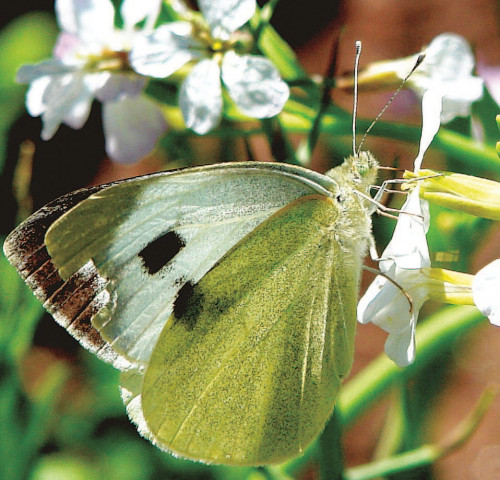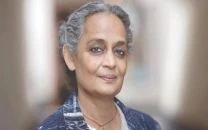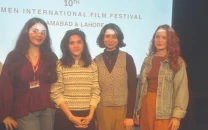Girl interrupted - boys only, please
A baby girl died because no doctor was called to examine her after a fall. This wouldn't have happened to a boy.

There are boxes, envelopes and packets of seeds scattered all over the dining-table, each variety calling out to be sown next. A bucket behind the back door contains three dozen rose cuttings taken from a friend’s garden, each one to be carefully planted then nurtured to red, pink and cream fruition. Trays of germinating tomato, capsicum and aubergine seedlings are asking to be transplanted and the dogs, as always, are impatient to keep me company while I work. This is my world — a world in which I find healing, peace and renewal, a refuge from the vicious world ‘outside’ where shocks lurk around far too many corners for comfort.
A phone call: dreadful news. A baby girl, merely two months old, had died. It was necessary for me to attend her funeral. I walked, with a sorrowful heart, through tall pine trees draped with wreaths of mauve clematis: birds trilling, a stream splashing over moss-coated rocks, the tangy fragrance of warm resin in the air. Silent figures swathed in chadors, male and female, grubby children, flocked to the house, each displacing his or her own personal share of sorrowful space in what had been the baby’s home, in which she lived, breathed, was fed and comforted when she cried. Her mother was nowhere to be seen. In-laws and other relatives somberly shook hands with arriving mourners. Men were led in one direction, women in another, subdued children slipping in and out of the hastily erected barrier of worn out blankets draped over a stretched length of rope suspended between the dismal house and an axe-scarred tree.
Grubby children shyly smiled greetings in my direction, slowly inching closer to my perch on a wobbly plastic chair as I made limited conversation with the women and girls huddling on cotton mattresses that had seen better days. The children, lice-infested and filthy beyond reason, were round-eyed in anticipation of biscuits destined for important guests; others in the women’s quarter were being served far less costly slices of dry, packaged bread whilst, this being a Pashtun household, the men feasted on biryani. The women and children would, in time, get their leftovers…if there were any. Two young girls, perhaps 4 and 6 years old, wandered around in a daze, seemingly not knowing what to do with themselves. Slightly better dressed than the other children, they were obviously sisters. Their faces thin and sharp, hair shaved close to their skulls, skin painfully etched with either weeping eczema or psoriasis which, their mother explained, didn’t go away no matter how my ‘toobes’ of doctor’s medicine she applied. Hugging a plump, kohl-eyed, rosy-cheeked, little boy on her lap she bemoaned that fate had sent her two retarded daughters. The girls were actually 8 and 12 years old but hadn’t grown in height since they were 4 or 5 years old and were considered incapable of learning even the simplest things. What their life would be didn’t bear thinking about although I, for one, couldn’t help but hopelessly speculate.
The deceased baby, I learnt, had fallen asleep in her mother’s arms when she was being fed just after dawn and had not woken up. Someone said that she had been ill from birth, that she had some kind of growth on her chest, that she was at least three times larger than a baby of that age should be. Someone else said that the baby was fine until someone dropped her the previous night, hurting her badly in the process, but no, a doctor wasn’t deemed necessary, as it was only a girl after all. Shock rolled over me in waves. I was horrified and angry all at once. About 4 months prior to this sad event, I’d received a late night phone call telling me that a little boy from this clan had fallen off the roof and split his head open like a melon and which doctor should they take him to? What the child was doing playing on the roof after dark — or playing on the roof at all, for that matter — was besides the point in this emergency. It was later explained as being nothing more than high spirits as in ‘boys will be boys’ and I arranged for them to be met at the hospital emergency department by the medical specialist on duty, along with a surgeon. The boy is fine now and the scars something to be proud of. The baby girl, his first cousin (every member of that massive family is dangerously inter-related to the point where birth defects and other abnormalities are common) was judged by her gender. As far as can be ascertained, there is no record of either her birth or her death. The poor child isn’t even a statistic as she simply didn’t exist.
Other people’s cultures and customs are, on the whole, something to be both honoured and respected and I know of many Pashtuns who have the utmost respect for women. But there are others, often uneducated, whose treatment of women is utterly appalling. Such treatment of females is also evident in sections of the Punjabi, Sindhi, Baluch and Kashmiri peoples too and, unless and until quality education is made freely available to all and sundry, this state of affairs will remain unchanged. It is also true that education alone, particularly of the standard currently dished out by poorly qualified teachers when they can be bothered to give classes at all, will not be enough to improve ignorant attitudes. Far more than basic education will be required to make a dent in the misconceptions which have been allowed to flourish unhindered for so long.
The manner of this baby’s death has stirred up personal emotions which I usually manage to keep largely in check and, quite frankly, it took me quite a few days of determinedly losing myself in the garden, in the physical activities of planting and weeding and cutting the grass, before I was able to regain some form of equilibrium, let alone sleep at night. The painful knowledge that we, the entire human race, are equally responsible for such events is going to haunt me for a long time to come.
Published in The Express Tribune, Sunday Magazine, May 8th, 2011.



















COMMENTS
Comments are moderated and generally will be posted if they are on-topic and not abusive.
For more information, please see our Comments FAQ